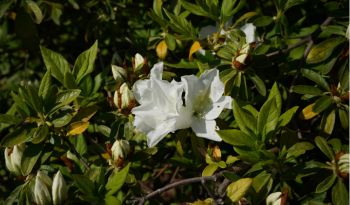Zmeniť alergie vyvolané: typy a opravné účinky

Pre výskyt, ak sú trpia sezónnymi alergiami, môžu znamenať svrbenie očí, východ z nosa, upchaté hrdlo a všeobecný pocit úplného biedy.
Aj keď s veľkým množstvom spolie môže byť voľný predajný prostriedok na alergiu, môžete prekvapiť, že príroda má silné riešenia na zmiernenie alergií. Mnohé jednotky uľahčujú riešenia na zmiernenie alergií, môžu byť znížené riziko vedľajších účinkov a hodnotenie holistického hľadiska životného prostredia.
Tu je 6 prírodných zlúčenín, ktoré sa vrátia do vášho kolesového tímu, ktoré pomáhajú zmierňovať alergie.
Vitamíny, ktoré zmierňujú alergie
Vitamíny zohrávajú zásadnú účinnosť pri udržiavaní celkovej zdravia tela, od podpory zdravého rastu až po žiarivé účinky a silné nechty. Výskum naznačuje, že vitamíny, ak C a D tiež obsahujú symptómie sezónnych alergií.
Vitamín C
Vitamín C, tiež nazývaný ako askorbová kyselina, je základným životom, ktorý pomáha telu na procesoch, od výroby kolagénu až po imunitný systém. Vitamín C môže byť tiež účinný pri úľave od alergií.
Vitamín C môže zabrániť žírnemu bunkámu obsahujúcim histamín do tela. Žierne bunky sú imunitné bunky, ktoré pomáhajú chrániť telo pred patogénmi. Keď sa žírne bunky stretávajú s cudzími útočníkmi, existujú určité molekuly, ak je heparín a histamín, do krvného obehu a tkanív. Histamín je jediný s primárnymi molekulami, ktoré spôsobujú alergie, ak ide o smer, výskyt a opuch.
Štúdie naznačujú, že vitamín C môže pomôcť zabrániť účinnému histamínu v reakcii na alergéniu.
Jedna klinická štúdia zameraná na obsah vitamínu C a studeného histamínu v 89 percentách. V štúdii sa vyskytli 19 pacientov s alergickými ochoreniami a 70 s infekčnými chorobami. Ukážeme, že pacienti podávali intravenózne (cez IV) 7,5 g vitamínu C. Štúdia zistila, že studený histamín v sérii klesli v liečebných ochoreniach, ale výskyt bolesti v prípade alergického ochorením.
Štúdie naznačujú, že vitamín C môže obsahovať histamínovú produkciu alebo zastaviť jeho prípravu žírnych buniek. Čo sa týka, že vitamín C je prítomný v histamíne, vitamín D môže eliminovať alergie iných.
Vitamín D
Vitamín D je spojený so zdravím kostí, ale tento vitamín je prítomný v tele má aj ďalšie úlohy, ak je podporou imunitného systému.
Štúdie naznačujú, že vitamín D znižuje alergickú rinitídu, všeobecne známu ako senná nádcha. Metaanalýza zameraná na výskyt doplnkov vitamínu D na sennú nádchu. Po skúmaní viac ako 2000 článkov a 5 randomizovaných kontrolovaných štúdií metaanalýzy zistilo, že v porovnaní s placebom suplementácia vitamínu D bez použitia kortikosteroidov ovplyvňuje sennú nádchu.
Ďalšia metaanalýza týchto výsledkov obsahuje doplnky vitamínu D v liekoch, ktoré ovplyvňujú alergické ochorenia. Štúdia analyzovala výsledky 32 randomizovaných kontrolovaných štúdií, ktoré majú viac ako 2 000 pacientov a zistili, že doplnok vitamínu D bol spojený so zníženou závažnosťou atopickej dermatitídy a sennej nádchy.
Výskum naznačuje, že vitamín D môže byť účinný pri úľave od alergických regulačných imunitných systémov.
Minerály, ktoré spôsobujú úľavu od alergií
Aj keď vitamíny majú silné vlastnosti na zmiernenie alergie, štúdie naznačujú, že minerály ako zinok môžu tiež obsahovať silnú dávku.
zinok
Zinok je minerál potenciálny pre viac ako 300 telesných reakcií. Jeho nedostatok je spojený s pacientmi, od pomalého rastu až po zlé imunitné zdravie.
Štúdie naznačujú, že nedostatok zinku môže tiež prispieť k alergii. Táto štúdia spájala nedostatok zinku s nárastom rizikového vzniku symptómových alergií, ktoré sú päťkrát častejšie, ak sa u nich vyskytujú, nemajú nedostatok zinku.
V tomto prípade môže doplnok zinku zmierniť alergie. Jedna intervenčná štúdia sa zamerala na liečbu perorálnych doplnkov zinku u pacientov s ťažkými sezónnymi alergiami. Štúdia obsahovala 34 príspevkov do 2 skupín. Liečená skupina dostávala 40 mg zinku je cetirizín, antihistaminikum. Kontrolovaná skupina priaznivých iba cetirizín.
Po týždňovej štúdii sa objavia symptómové alergie v skupinách zinku a zvýšenie kvality života.
Uvedomujú sa, že doplnok zinku, keď sa vyskytne nedostatok nápravy, môže zmierniť alergie vyváženého imunitného systému a vyrovnať sa s histamínovými žírmi.
Doplnky, ktoré spôsobujú zlepšiť alergie
Mnohé z nich môžu byť pre celkové zdravie zrýchlené. Napríklad táto štúdia začínajú naznačovať, že prírodné zlúčeniny, ak je kvercetín a olej z čiernych semien, môžu byť účinné pre zmiernenie alergie.
kvercetín
Ktoré vitamíny a minerály môžu obsahovať kľúčové účinky pri imunitnej regulácii a znížení alergie, iné silné účinky môžu eliminovať výskyt alergie.
Výskum naznačuje, že kvercetín môže byť silným prírodným účinkom na zmiernenie alergie. Kvercetín je použitý so zeleným čajom, ktorý sa používa v rôznych potravinách, od špargle po zelenom čaji.
Kvercetín sa často považuje za silné protizápalové účinky, ale môže byť aj silným antialergickým činidlom. Jedna randomizovaná, dvojitá zaslepená, placebom kontrolovaná štúdia s paralelnou skupinou skúmala doplnky kvercetínu na sezónne alergie.
Do štúdie zapojilo 66 ľudí vo veku od 22 do 78 rokov, v tomto týždni použili 200 mg kvercetínu počas 4 týždňov. Štúdia zistila, že v skupinách s kvercetínom ochorením sa vyskytujú príznaky alergie, ak sú svrbenie očí, dýchanie, nádcha a problémy v Spojených štátoch sú sezónnymi alergiami.
Štúdia tiež zisťuje, že kvercetínová skupina hlási kvalitu života v porovnaní s kontrolnou skupinou. Štúdie naznačujú, že kvercetín môže vyvolať alergie inhibujúce produkcie a liečbu histamínu.
Olej z čiernych semien
Nigella sativa, všeobecne známa ako čierne semeno, čierna rasca alebo čierna rasca, je jednoročná rastlina s bledomodrými alebo bielymi kvetmi. Vyskytuje sa do čeľade Ranunculaceae spolu s ďalšími rastlinami, ktoré sa používajú v medicíne, ak je napríklad zlato.
Čierne semeno sa po stáročia môže používať v Blízkom východe, ako tradičný liek na obklady, pečenie, pľúc a prenos systému. Moderné vedy naznačujú, že čierne semeno môže tiež zmierniť alergie.
Jeden prospektívny dvojitý zaslepený placebom kontrolovaným štúdiom skúmal olej z čiernych semien na mieste so sennou nádchou. Do štúdie bolo zahrnutých 66 osôb, ktoré sú určené aj samotným, s minimálnym vekom má 47 rokov.
Štúdia trvala 30 dní a zistila, že olej z čiernych semien môže spôsobiť alergie, ak je svrbenie a nádcha, chutie a upchatie nosa do 15 dní od prvého použitia.
Ďalšia kontrolovaná klinická štúdia skúmala olej z čiernych semien na 68 sekundách so sennou nádchou. Členovia bolesti oddelenia zahŕňajú symptómy, ktoré sú bolestivé, stredne závažné alebo závažné. Štúdia tiež malú kontrolovanú skupinu, pričom chýba olej z čiernych semien.
Na konci 6 týždňov štúdie sa zistia, že pacienti v miernej skupine bolí bez výskytu, čo je časť stredne závažných a závažných skupín bola bez výskytu, alebo malého počtu pacientov, 93,7% a 83,3%. To je v kontraste s 30,1%, boli prihlásené údaje v kontrolovej skupine.
Štúdie naznačujú, že olej z čiernych semien je silný protizápalový účinok a jeho vlastnosť môže spôsobiť zmiernenie alergie.
Probiotiká
Zvýšenosť zdravia čriev precejšní. Zlé zdravie čriev je spojená so širokou škálou porúch, od cukrovky a obezity až po chronický zápal.
Probiotiká pomáhajú zmierňovať alergie. Jedna randomizovaná dvojitá zaslepená placebom kontrolovaná štúdia sa zamerala na to, ak probiotická suplementácia môže obsahovať sennú nádchu.
Štúdia trvala až 12 týždňov a trvala s 40 týždňami, ktoré zahŕňajú trpeli sezónne alergie. Zistilo sa, že v liečebných skupinách sa vyskytujú alergické ochorenia, ak sú nádherné, a ak sa prejavujú kvalitou života, lepší spánok a menštruácia.
Ďalšia randomizovaná, placebom kontrolovaná, dvojitá zaslepená prospektívna štúdia, mala 106 pacientov a trvalo 90 dní, sa zamerala na účinnosť probiotikov v porovnaní s prebiotikami pri znížení účinnosti sennej nádchy. Štúdia zistila, že symptómové alergie v probiotickéch/prebiotických skupinách porovnávajú skupinu s placebom.
Upozorňujeme, že probiotiká znižujú sezónne alergie, ktoré regulujú zdravie čriev a podporujú imunitný systém.
- jedlo so sebou
Ak trpíte sezónnymi alergiami, staré počasie nemusí prinášať svrbenie očí, nádherné alebo nekontrolovateľné kŕmenie. Prírodné alergie môžu byť momentálne cennými potenciálne užitočnými látkami, ak sú vitamín C, vitamín D, zinok, kvercetín, olej z čiernych semien a probiotiká. Pridanie prírodných prístupov k antialergickým rutinám môže spôsobiť dlhotrvajúci úľavu od alergie, aby ste sa mohli dostať a odstrániť si jar.
Referencia:
- Hagel AF, Layritz CM, Hagel WH a kol. Intravenózna infúzia kyseliny askorbovej inhibuje koncentráciu histamínu v sére v liečbe s alergickými a nealergickými látkami. Naunyn Schmiedeberg Arch Pharmacol. 2013; 386 (9): 789-793. Doi: 10.1007/s00210-013-0880-1
- Kazama I, Sato Y, Tamada T. pyridoxín synergicky potenciuje vlastnosti kyseliny askorbovej stabilizačnej žírnej bunky. Cell Physiol Biochem. 2022; 56 (3): 282-292. doi: 10.33594/000000534
- Maintz L., Novak N. Histamínová intolerancia. Sám. J. Clin. Č. 2007; 85:1185 —1196. doi: 10.1093/ajcn/85.5.1185.
- Biely MV. Vyskúšajte histamín pri alergických ochoreniach. J Allergy Clin Immunol. 1990; 86 (4 Pt 2): 599-605. doi: 10.1016/s0091-6749 (05) 80223-4
- Kawada K, Sato C, Ishida T a kol. Suplementácia vitamínu D a alergická rinitída: Systematický prehľad a metaanalýza. Medicína (Kaunas). 2025; 61 (2): 355. Publikované 18. februára 2025. doi:10.3390/medicina61020355
- Li Q, Zhou Q, Zhang G a kol. Suplementácia vitamínu D a alergické účinky v detstve: Systematický prehľad a metaanalýza. Živiny. 2022; 14 (19) :3947. Publikované 23. septembra 2022. doi:10.3390/nu14193947
- Mirzakhani H, Al-Garawi A, Weiss ST, Litva AA. Vitamín D a vývoj alergických ochorení: aké sú účinky? Clin Exp Alergia. 2015; 45 (1) :114-125. doi:10.1111/cea.12430
- Mirza MA, Mahmood S, Hilles AR a kol. Kvercetín ako terapeutický produkt: hodnotenie jeho farmakologických účinkov a klinických aplikácií - prehľad. Farmaceutické výrobky (Bazilej). 2023; 16 (11): 1631. Publikované 20. novembra 2023 doi:10.3390/ph16111631
- Yamada S, Shirai M, Inaba Y, Takara T. Opakované perorálne doplnky obsahujúce kvercetín na alergickú reakciu: randomizované, placebom kontrolované, dvojité zaslepené paralelné štúdie. Eur Rev Med Farmakol Science. 2022; 26 (12): 4331-4345. doi: 10.26355/eurrev_202206_29072
- Mlcek J, Jurikova T, Skrovankova S, Sochor J. Quercetín a jeho antialergická imunitná odpoveď. Molekulárny. 2016; 21 (5): 623. Publikované 12. mája 2016. doi:10.3390/molecules21050623
- McCall KA, Huang C, Fierke CA. Funkcia a mechanizmus zinkových metaloenzýmov. J Nutr. 2000; 130 (doplnok 5S): 1437S-46S. doi:10.1093/JN/130.5.1437s
- Maywald M, Rink L. Nedostatok zinku a doplnenie zinku pri alergických ochoreniach. Biomolekuly 2024; 14 (7): 863. Publikované 19. mája 2024. doi:10.3390/biom14070863
- Dewi AM, Setyorini DI, S-. Zinc suplementation on the analysis of Clinical Symptómov a kvalita života s pretrvávajúcou stredne ťažkou alergickou rinitídou. Front Pharmacol. 2019; Abstrakt konferencie: Medzinárodná konferencia o publikáciách a translačnej medicíne 2018 (ICDDTM '18) „Vykonávanie opatrení a výziev presnej medicíny“. doi: 10.3389/conf.fphar.2018.63.00084.
- Marone G., Columbo M., de Paulis A., Cirillo R., Giugliano R., Condorelli M. Fyziologická koncentrácia zinku inhibuje využitie histamínu z ľudských bazofilov a pľúcnych buniek. Akcie agentov. 1986; 18:103 —106. doi: 10.1007/BF01987995.
- Dabeer S, Rather MA, Rasool S a kol. Kapitola 1 - História a tradičné použitie čiernych semien (Nigella sativa). V: Khan A, Rehman MU, vyd. Čierne semená (Nigella Sativa). Elsevier; 2022:1-28. Doi: 10.1016/B978-0-12-824462-3.00016-0.
- Nikakhlagh S, Rahim F, Aryani FH, Syahpoush A, Brougerdnya MG, Saki N. Bylinná alergická rinitída: použitie Nigella sativa. Ako J Otolaryngol. 2011; 32 (5) :402-407. doi:10.1016/j.amjoto.2010.07.019
- Alsamarai AM, Abdulsatar M, Ahmed Alobaidi AH. Hodnotenie topického oleja z čiernych semien pri liečbe alergickej rinitídy. Protialergické látky Protialergické látky Med Chem. 2014; 13 (1) :75-82. doi:10.2174/18715230113129990014
- Zhang YJ, Li S, Gan RY, Zhou T, Xu DP, Li HB. Črevných ochorení na ľudské zdravie a choroby. Medzinárodná veda 2015; 16 (4): 7493-7519. Publikované 2. apríla 2015. doi:10.3390/ijms16047493
- Ried K, Travica N, Paye Y, Sali A. Probiotická formulácia na sezónne alergické rinitídy u pacientov - Randomized double zaslepená placebom kontrolovaná štúdia: Probiotics pre sennú nádchu. Front Nutr. 2022; 9:887978. Publikované 23. mája 2022. doi:10.3389/fnut.2022.887978
- Hou Y, Wang D, Zhou S a kol. Probiotiká v kombinácii s prebiotikami zmiernili alergickú rinitídu zmenili zloženie a metabolické vlastnosti čiernej mikroflóry: prospektívna, randomizovaná, dvojitá zaslepená, placebom kontrolovaná klinická štúdia. Predný Immunol. 2024; 15:1439830. Publikované 1. novembra 2024 doi:10.3389/fimmu.2024.1439830
VYHLÁSENIE: Toto Centrum zdravia a pohody neposkytuje diagnózu,...
















































































 Obsah
Obsah














